#ottoman art
Explore tagged Tumblr posts
Text

Panel for a mihrab (wall niche in a mosque indicating the direction of Mecca), made by an unknown Ottoman artist active in Anatolia or northern Syria, ca. 1604-05. Medium: glazed ceramic tile. Location: Hood Museum of Art, Dartmouth College, Hanover, NH, USA.
#art#art history#Islam#Islamic art#Ottoman#Ottoman Empire#Ottoman art#mihrab#decorative arts#ceramics#17th century#17th century art#Hood Museum of Art
162 notes
·
View notes
Text
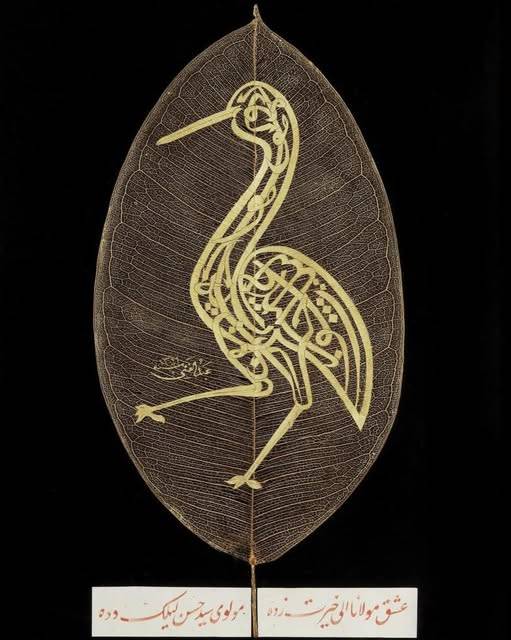
Gold calligraphy on leaf in the form of a stork, the text comprising a Sufi verse, signed Abd al-Ghani. 1893, Ottoman Turkey.
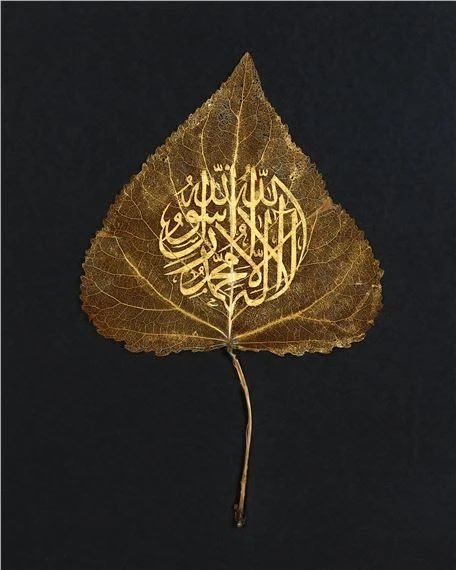
Calligraphy Leaf Ottoman Turkey 19th century, Bismallah in gold.
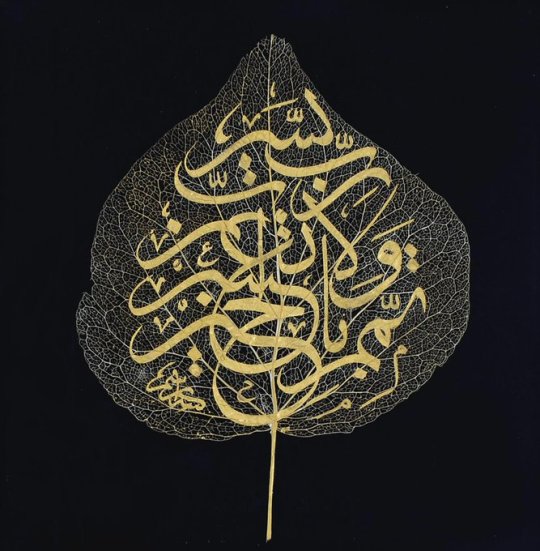
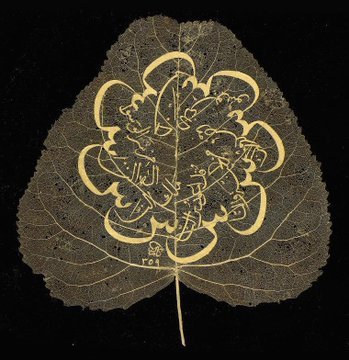
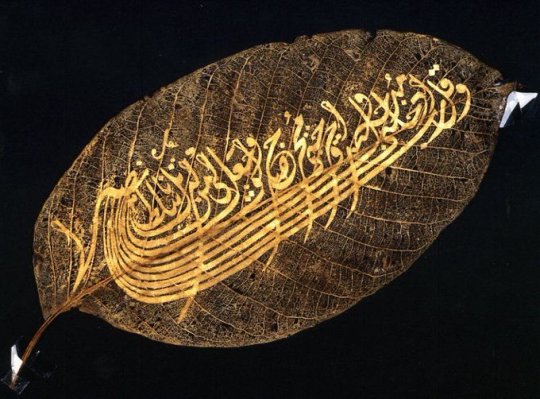
Chestnut leaf inscribed with a Qur’anic verse from Surat al-Isra’ (“The Night Journey,” Q17:80), which reads: “And say, ‘Lord grant me a good entrance and a goodly exit, and sustain me with Your power.”
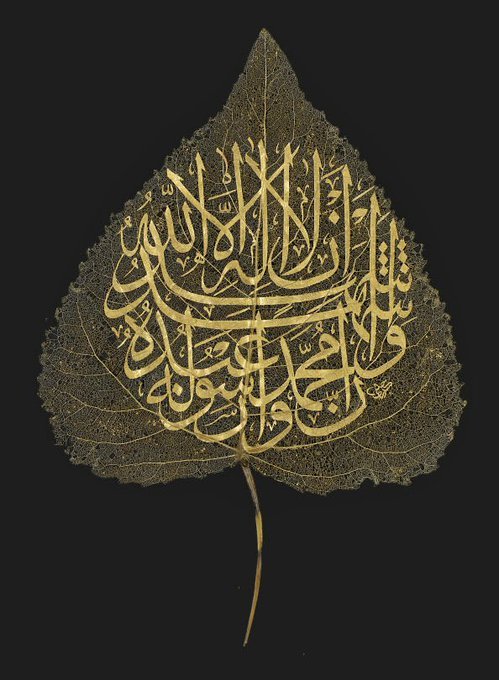
Arabic composition in gold on a natural leaf, the text comprising the Shahadah in intertwining thuluth script.
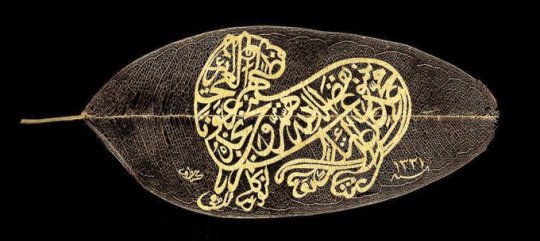
Arabic composition applied on to a natural leaf in gold, the text in the form of a lion incorporating verses praising the Imam 'Ali by al-Sherif al-Murtaza
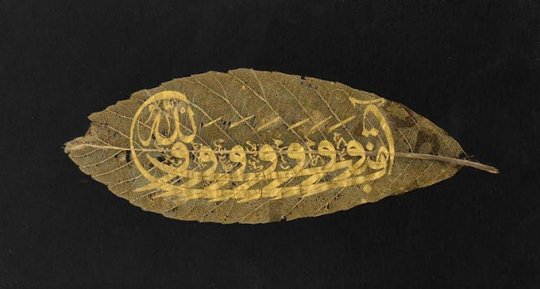
Arabic composition applied onto a natural leaf in gold, the text incorporating the words Allah, Angels, the Prophets, the Day of Judgment in the form of a sailing boat with seven oars, one for each of the Seven Sleepers.
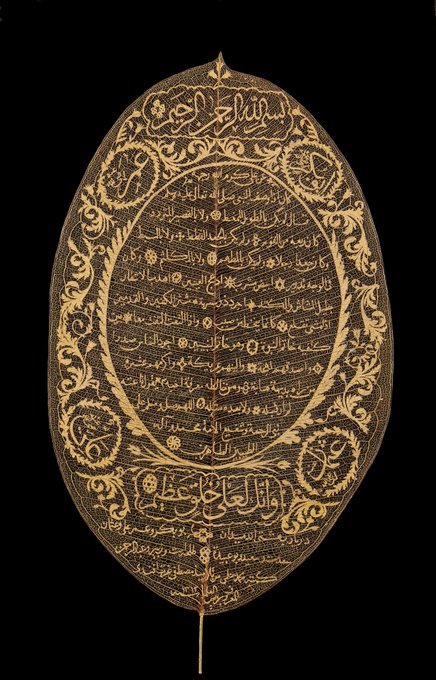
Calligraphic composition in gold on a large natural leaf incorporating the hilyeh, the physical attributes of the Prophet Muhammad (PBUH) signed by Muhammad Helmi, a pupil of Mustafa Izzet Effendi.
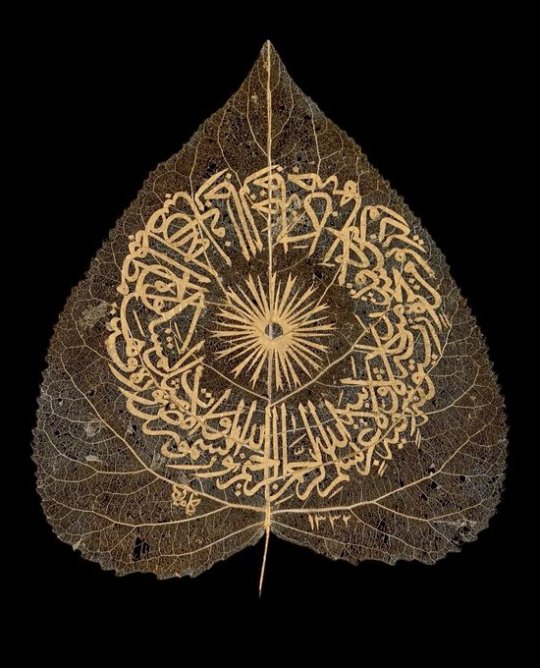
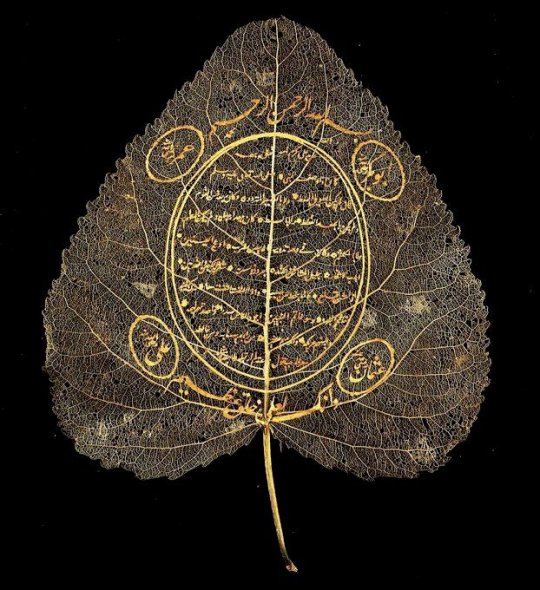
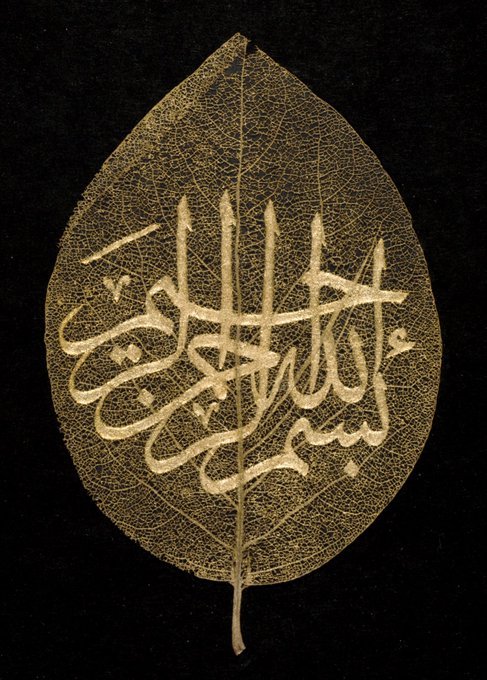
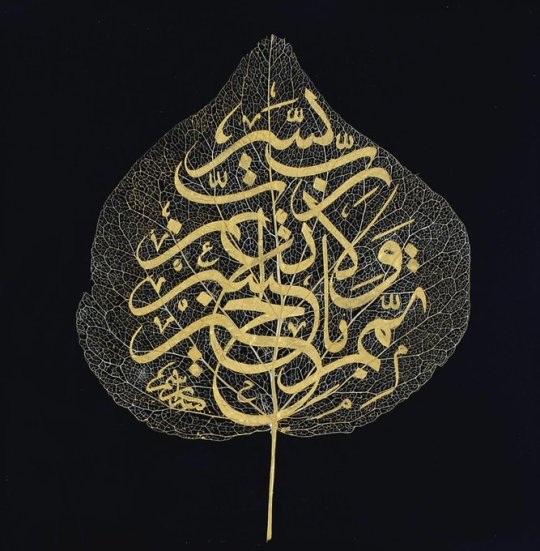
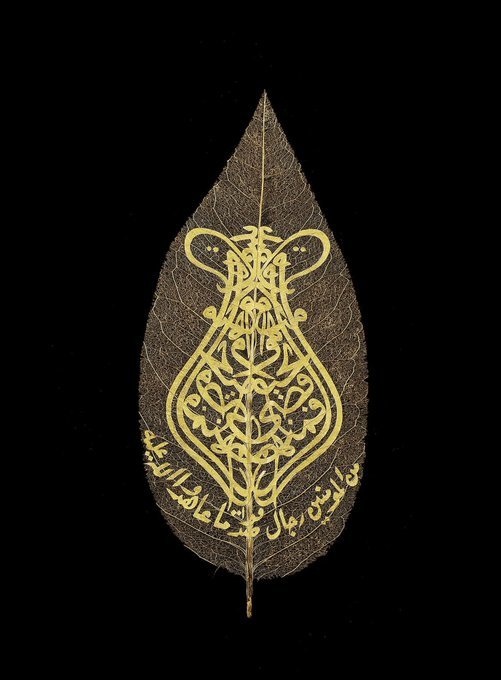
Arabic composition applied in the shape of a vase onto a natural leaf, the text from the Qur'an, surat al-Ahzab, chapter XXXIII, verse 23
Here's the Twitter thread where I found these.
46 notes
·
View notes
Text
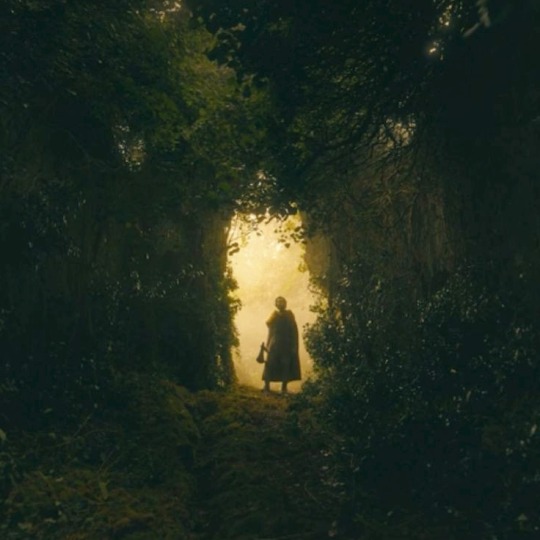

The Green Knight dir. David Lowery (2021)
Light of the forest by "Şeker" Ahmed Pasha (1887)
#felt like gawain walking into the forest as i approached this painting#the green knight#ottoman art#dev patel#sir gawain and the green knight
31 notes
·
View notes
Text

Ottoman mother-of-pearl-inlaid wooden child's cradle - 18th/19th century. Turkey
Via Sotheby's
22 notes
·
View notes
Text

Another Marbled Monday, lining the boards on Isl. Ms. 382 (copied 1768) a manuscript copy of Tarih-i İzzi (تاريخ عزي) --- official Ottoman history covering the years 1157-1165 (1744-1752) composed by official historiographer Süleymân İzzî (d.1755)
Browse the description and images of the entire manuscript online!
#marbled monday#marbled paper#marbled#marbling#paper marbling#libraries#archives#special collections#special collections libraries#libraries and archives#special collections and archives#islamic arts#islamic manuscripts#ebru#ebrusanatı#ottoman manuscripts#yazmalar#el yazma#yazma eserler#manuscript culture#ottoman culture#ottoman history#ottoman art#ottoman empire#المخطوطات#المخطوطات الاسلامية#المخطوطات العثمانية#آبرو#آبرو باد#ابر و باد
14 notes
·
View notes
Text
#TwoForTuesday on #TilesOnTuesday:

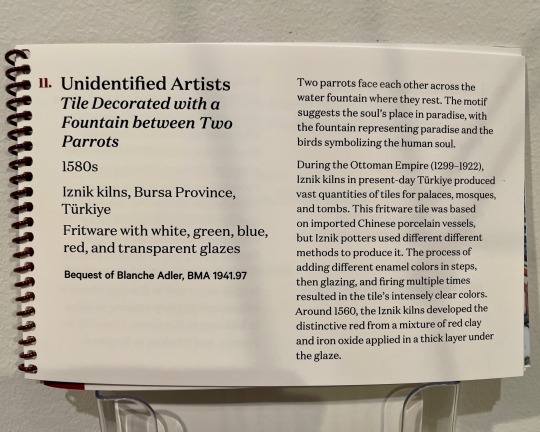
Tile Decorated with a Fountain between Two Parrots, 1580s
Iznik kilns, Bursa Province, Türkiye (Ottoman Empire)
Fritware with white, green, blue, red, and transparent glazes
on display at Baltimore Museum of Art
#animals in art#museum visit#birds in art#bird#birds#parrot#parrots#pair#tilework#tile#ceramics#Ottoman art#Turkish art#Islamic art#Baltimore Museum of Art#16th century art#fritware#Iznik tile
65 notes
·
View notes
Text

Iznik border tile, Turkey circa 1575
Sotheby's
17 notes
·
View notes
Text

Melchior Lorichs, Panorama of Constantinople, Fatih Mosque
"... the Islamic characteristics are best represented by the Ottoman cities: "The ones who build the paradise where there exist no conflicts but all the beauties, tried to rise and open the Gates of paradise by accomplishing the task of beautifying the world." Ottoman architecture
24 notes
·
View notes
Text

Dilruba in harem🌱
(pls click for better quality😭)
9 notes
·
View notes
Text

Osman Hamdi Bey, A Young Emir Studying, 1905, oil/canvas (Walker Art Gallery, Liverpool)
7 notes
·
View notes
Text

Ottoman Traditional Turkish Tiles
10 notes
·
View notes
Text

Rumelihisarı as seen from Bosphorus strait.
Rumelihisarı, also known as the Rumelian Fortress or Roumeli Hissar Fortress, and sometimes referred to as Boğazkesen Fortress (meaning "strait-cutter fortress"), is a medieval Ottoman stronghold situated in Istanbul, Turkey. It stands on a series of hills along the European side of the Bosphorus. The fortress gives its name to the surrounding neighborhood within the city's Sarıyer district.
Built between 1451 and 1452 CE under the orders of Sultan Mehmed II, the fortress was constructed as part of preparations for the Ottoman siege of the Byzantine city of Constantinople. Its purpose was to block any potential maritime aid from the Bosphorus Strait to the Byzantines, giving rise to its alternative name, "Boğazkesen," or "Strait-cutter" Castle. A sister structure, Anadoluhisari ("Anatolian Fortress"), lies on the opposite side of the Bosphorus, and together, they effectively controlled naval traffic during the siege, playing a critical role in the Ottomans' successful conquest of Constantinople (later renamed Istanbul) in 1453.
Following the conquest, Rumelihisarı functioned as a customs checkpoint and occasional prison, notably detaining diplomats from enemy states. After sustaining significant damage in the Great Earthquake of 1509, it was restored and remained in use until the late 19th century.
Today, the fortress is a popular museum and serves as an open-air venue for concerts, art festivals, and special events.
#ottoman#ottoman art#ottoman history#ottoman empire#turkish#turkish history#turkish art#islamic#islamic history#islamic art#medieval#middle ages
4 notes
·
View notes
Text
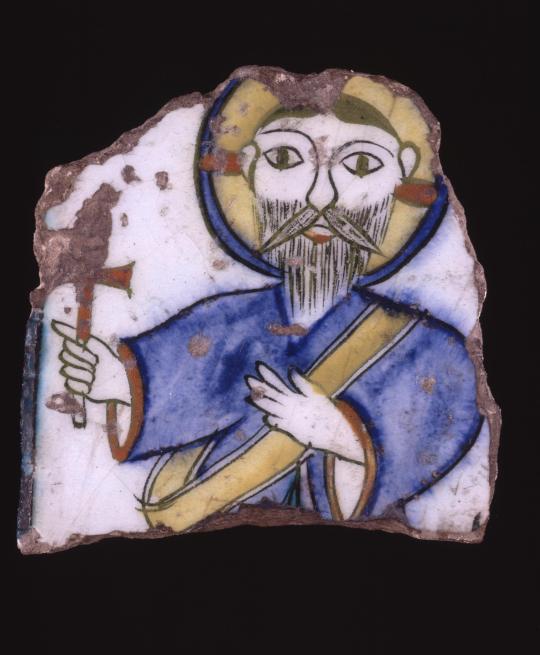
Tile fragment with an Armenian deacon holding a cross.
Kütahya, Aegaean region of Turkey, ca. 1720
British Museum
19 notes
·
View notes
Text
An outstanding icazetname in Isl. Ms. 438
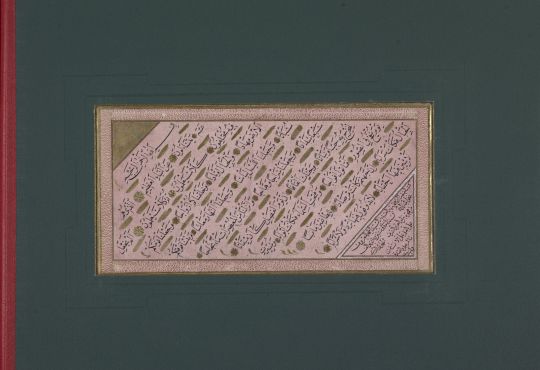
First part of a calligraphy license or diploma (icazetname) in naskh (nesih) script, mounted in fol.17b in Isl. Ms. 438, Islamic Manuscripts Collection

Second part of a calligraphy license or diploma (icazetname) in naskh (nesih) script, mounted as a separate piece in fol.21a in Isl. Ms. 438, Islamic Manuscripts Collection
Enjoy this post by Sumeyra Dursun, 2023 Heid Fellow, from her research in the Islamic Manuscripts Collection. Sumeyra is a doctoral candidate in the history of Islamic arts at Yildiz Technical University in Istanbul.
Read more!
#libraries#archives#special collections#special collections libraries#libraries and archives#archival collections#archival research#rare books#rare books and special collections#archives and special collections#research fellowships#heid fellows#fellowships#islamic manuscripts#hat sanatı#hattat#hattatlar#el yazma#yazmalar#yazma eserler#ottoman culture#ottoman history#turkish arts#turkish history#ottoman art#calligraphy#calligraphers#calligraphic#calligraphy practice#calligraphy art
15 notes
·
View notes
Text
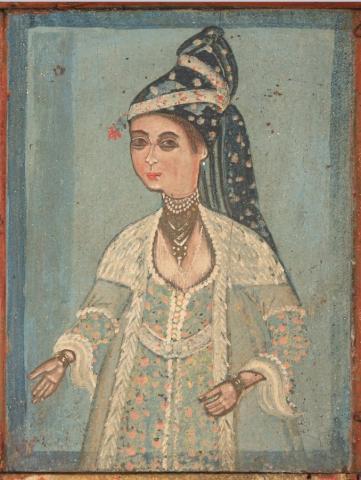
Ottoman-era oil portrait of a lady found at the Ethnological Museum’s House of Hadjigeorgakis Kornessios in Nicosia. This is an oil on wood portrait, found on a grandfather clock’s wooden case. The clock was made by British clockmaker Isaac Rogers, and was previously owned by Michael de Vezin, the English Consul to Aleppo and Cyprus.
The lady’s dress resembles a caftan dress worn during Ottoman rule called ‘anteri/entari’ which is characterized by the long, oval neckline and a light chemise underneath. The style of this outfit is similar to the ‘sayia/üç etek’, a staple of Cypriot traditional dress. She also wears a long robe lined with fur called a tzouppe/cübbe. The style of the headdress and jewellery indicate her higher social status.
Image source: Department of Antiquities in Cyprus.
Source information provided by Euphrosyne Rizopoulou-Egoumenidou’s research on 18th and 19th century Cypriot dress and the House of the Dragoman of Cyprus Hadjigeorgakis Kornessios.
https://books.openedition.org/pur/99860?lang=en
https://www.boccf.org/publications-holder/Guides-to-Archaeological-Sites-and-Monuments/The-House-of-the-Dragoman-of-Cyprus-Hadjigeorgakis-Kornessios/
#cyprus#cypriot#cyprus archive#archive image#cypriot archive#sayia#üç etek#cyprus history#cyprus fashion#cypriot heritage#archive#photography#history#ottoman cyprus#ottoman empire#ottoman art#ottoman history
8 notes
·
View notes
